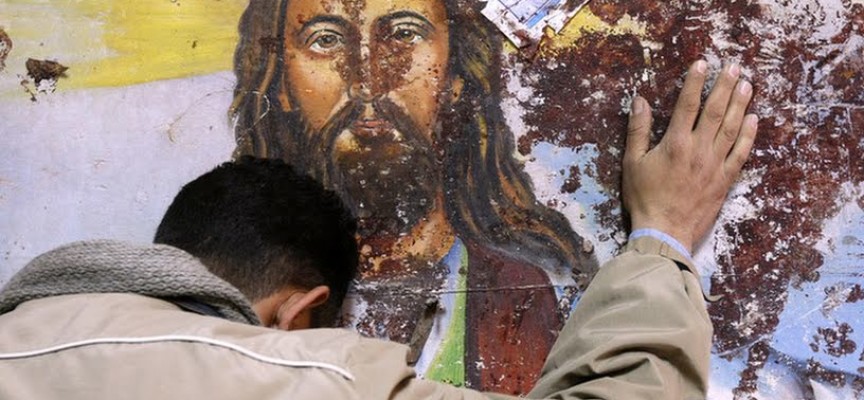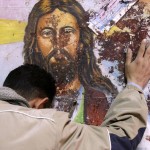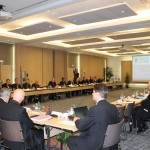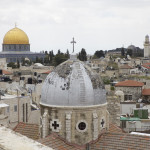“We reaffirm our communion with the Eastern Christian communities and minorities persecuted anywhere in the world”: these words can be read in the message signed by Archbishop Georges Pontier of Marseilles, who is also President of the French bishops. From France also comes the demand that “courageous initiatives” are taken to “ensure peace in these regions and to grant everyone an equal citizenship”, while the Catholic community continues to “support efforts made in their favour”.
French Catholics, in particular, are invited Friday, April 3rd, when the Catholic Church remembers the death of Christ and when Catholics raise to God a great prayer for the world, to “mobilize in prayer and fasting for persecuted populations and particularly for our Christian brothers” writes again the Archbishop of Marseille. The same invitation echoes a bit anywhere in Europe these days: to pray and mobilize as much as one can in favour of those Christians in the world who are not free to live their faith at the risk of life.
Germany has launched a great collection for Palm Sunday, as a gesture of solidarity for Christians in the Holy Land. And while Luxembourg hosts on that day Msgr. Yohanna Petros Mouche, Syrian Catholic Archbishop of Mosul et Qaraqosh (Iraq), currently in exile in Erbil (Iraqi Kurdistan), to hear his testimony, the churches of Sweden will pray on that same day for persecuted Christians in the Middle East. The initiative came from the Christian Council of Sweden. Wibor Karin, its secretary general, in the invitation remembers: “If we pray together, in various churches of different traditions across the whole country, we are sure that our prayers will have effects”.
There are many Swedish organizations working in the Middle East: “Despite these efforts, the situation is extremely serious and we feel great prostration for what is happening”. The churches in Sweden as well have not stopped directing appeals to politicians in the past months to do “everything in their power to protect the people and ensure peace and justice.” The call to prayer rings out on a global scale, through the invitation to pray for those affected by the wars in the Middle East launched in recent days by the general secretary of the World Council of Churches, rev. F. Olav Tveit. If the efforts of churches and Christians have not been able to generate a real change, as “Christians we are called to live in the hope that comes from Christ and make it our testimony in times of deep sorrow and struggle”.
“Ribadiamo la nostra comunione con le comunità cristiane orientali e le minoranze perseguitate ovunque nel mondo”, si legge nel messaggio firmato dall’arcivescovo di Marsiglia Georges Pontier, che è anche presidente dei vescovi francesi. Dalla Francia arriva anche la richiesta che “iniziative coraggiose” siano prese per “assicurare la pace in queste regioni e garantire a tutti un’uguale cittadinanza”, mentre la comunità cattolica continua a “sostenere gli sforzi messi in campo a loro favore”.
I cattolici francesi, in particolare, sono invitati venerdì 3 aprile, giorno in cui la Chiesa cattolica ricorderà la morte del Cristo e giorno in cui i cattolici fanno salire a Dio una grande preghiera per il mondo, a “mobilitarsi nella preghiera e nel digiuno per le popolazioni perseguitate e in particolare per i nostri fratelli cristiani”, scrive sempre l’arcivescovo di Marsiglia. Lo stesso invito riecheggia un po’ ovunque in Europa in questi giorni: pregare e mobilitarsi per quel che è possibile per i cristiani che nel mondo non sono liberi di vivere la loro fede, a rischio della vita.
La Germania ha indetto una grande colletta per la Domenica delle Palme, come gesto di solidarietà per i cristiani in Terra Santa. E mentre il Lussemburgo ha ospitato in quel giorno mons. Yohanna Petros Mouché, arcivescovo siriaco-cattolico di Mossoul et Qaraqosh (Iraq) attualmente in esilio a Erbil (Kurdistan iracheno), per ascoltarne la testimonianza, le Chiese della Svezia pregheranno in quello stesso giorno per i cristiani perseguitati in Medio Oriente. L’iniziativa è nata dal Consiglio cristiano di Svezia. Karin Wibor, che ne è segretaria generale, nell’invito pubblicato ricorda: “Se pregheremo insieme, in varie chiese di diverse tradizioni in tutto il Paese, siamo certi che la nostra preghiera avrà degli effetti”.
Molte sono le organizzazioni svedesi che lavorano in Medio Oriente: “Nonostante questi sforzi, la situazione è estremamente grave e sentiamo una grande prostrazione per ciò che sta accadendo”. Anche le Chiese della Svezia non hanno smesso nei mesi passati di rivolgere appelli ai politici per fare “tutto quello che è in loro potere per proteggere le persone e garantire la pace e la giustizia”. L’appello alla preghiera risuona su scala mondiale, attraverso l’invito alla preghiera per le popolazioni colpite dalle guerre in Medio Oriente lanciato nei giorni scorsi dal segretario generale del Consiglio mondiale delle Chiese, rev. Olav F. Tveit. Se gli sforzi di Chiese e di cristiani non sono ancora riusciti a generare un vero e proprio cambiamento, come “cristiani siamo chiamati a vivere nella speranza che ci viene da Cristo e renderla nostra testimonianza in tempi di profondo dolore e di lotta”.
Sarah Numico
Latest posts by Sarah Numico (see all)
- Neither lecturers nor teachers, but witnesses - 25 aprile 2015
- Holy Week with the persecuted - 30 marzo 2015
- They choose “to be in it” - 23 marzo 2015











